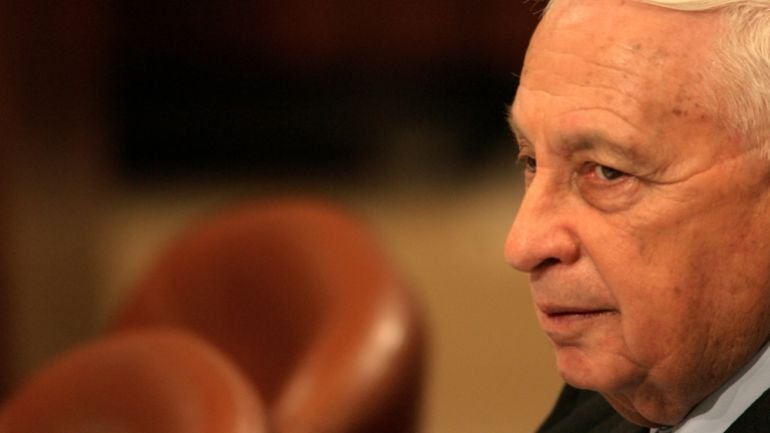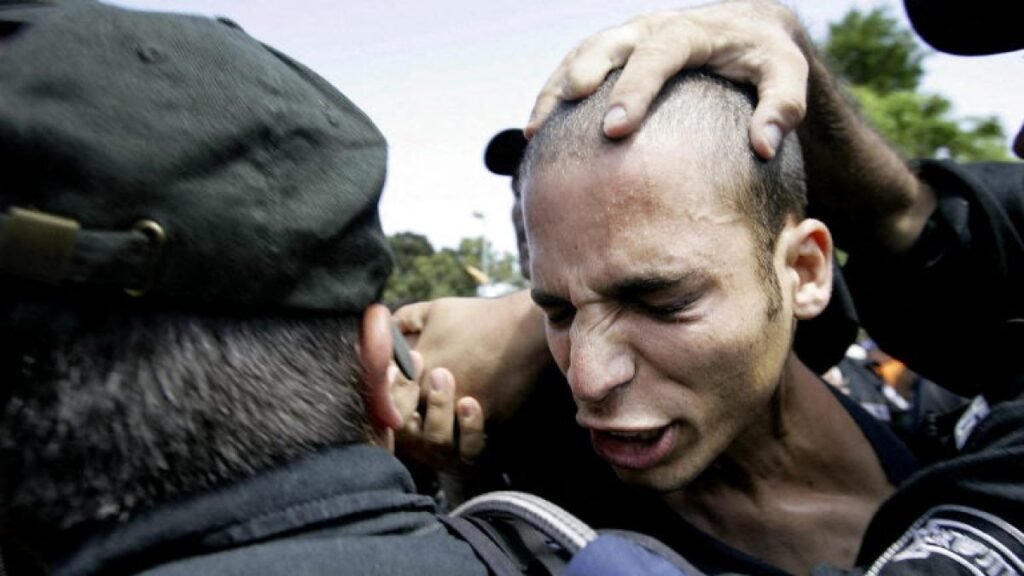Twenty years after leaving Gaza, it’s Israel’s far right and settler groups who are driving policy, analysts say
Twenty years ago this week, driven by a sense of curiosity, Yossi Mekelberg, now a senior consulting fellow with Chatham House, talked his way into a restricted Gaza to see firsthand the impact of Israel’s decision to disengage from the enclave.
“I joined a bus carrying settlers to one of the cemeteries in Gaza on the day of Tisha B’av,” he told media, referring to a day of mourning and fasting when Jews commemorate the destruction of their First and Second Temples and other historical tragedies.
Recommended Stories
list of 4 items
- list 1 of 4Israel’s Netanyahu says ‘there will be no Palestinian state’
- list 2 of 4‘Entire generation’ in Gaza would be denied education if UNRWA collapses
- list 3 of 4Israel wants to close the circle of history in Gaza
- list 4 of 4Israel’s Gaza ‘disengagement’ that paved the way for conquest
end of list
“They were in a trance. They were wailing,” he said of the added poignancy of the disengagement falling on a traditional day of mourning.
“It was almost transcendental for them, like an out-of-body experience.
‘From political wilderness to the heart of power’
The impact of former Israeli Prime Minister Ariel Sharon’s decision to dismantle the 21 illegal settlements in Gaza extended beyond the enclave.
Massive protests erupted across Israel as the demolitions approached, and tens of thousands of settlers and far-right supporters took to the streets.
Roads were blocked, sit-ins staged and government offices occupied. Clashes with police and soldiers escalated, leading to mass arrests.
“I spoke to one of the settler leaders. He said it wasn’t over by a long stretch,” Mekelberg continued. “Giving up Gaza wasn’t like giving up southern Lebanon or Sinai [in Egypt].
“[For them,] giving up Gaza was the first step towards giving up the West Bank and the entire project of Greater Israel. He told me that the next time the government tried this, they’d be ready. He was essentially talking about civil war.”
However, Israel’s withdrawal from the Gaza settlements raised hopes among optimists that it was genuinely committed to a long-term settlement with the Palestinians – and to the two-state solution it had formally endorsed a decade earlier.
Today, the reality could hardly be more different.
Israel, under the most far-right government in its history, now faces accusations of genocide at the International Court of Justice. Prime Minister Benjamin Netanyahu and former Defence Minister Yoav Gallant are wanted on war crimes charges by the International Criminal Court.
In Gaza, Israel has killed more than 64,000 people and imposed conditions that have caused famine. In the occupied West Bank, which it has occupied since 1967, annexation looms as a campaign of state-sanctioned displacement and violence is waged on the Palestinians who live there.
For many analysts, one of the key drivers for this shift in Israeli society is the far right’s and settler community’s response to the 2005 Gaza disengagement.
Fuelled by grievance and weaponised by Netanyahu, Israel’s settlers and far right have pursued state capture – gaining influence in government and across the country’s institutions from education to the bureaucracy and security services.
“It’s quite extraordinary,” said Robert Geist Pinfold, lecturer in international security at King’s College London. “The settlers have gone from the political wilderness to the very heart of power.”
Sharon’s gamble
Israel’s 2005 disengagement was presented to the United States, the United Nations and backers of the 2002 Arab Peace Initiative as a step back from occupation.
Yet many observers argued its true purpose was to preserve as much occupied land as possible while avoiding renewed negotiations over a two-state solution.
Principally, in the eyes of many academics, by disengaging unilaterally, Sharon was able to present Israel as the only credible diplomatic power within the region as well as preserving his hold on the West Bank.
Moreover, within two years of its disengagement, Israel had imposed a blockade on Gaza that remains to this day. It controls the passage of all people and goods, reducing Gaza to “the largest open-air prison in the world”, according to many rights groups, including Amnesty International.
Domestic pressures also played a role: The mounting political and economic costs of military campaigns in the West Bank and Gaza, where Israel had already killed thousands of Palestinians, as well as a desire to increase the Jewish majority within Israel’s borders all contributed to Sharon’s decision to give the appearance of taking one step back to take two forward.
“The disengagement arose from the political leadership’s recognition that the legitimacy for using military force had been exhausted,” Yagil Levy of Israel’s Open University Institute for the Study of Civil-Military Relations explained.
“This was compounded by growing resistance within the army’s ranks against remaining in Gaza when military operations were no longer achieving meaningful results, making an alternative approach necessary.
“Simultaneously, Israeli leadership concluded that abandoning Gaza would appease the United States while preserving freedom of action in the West Bank, a region of greater strategic importance to Israel.”

“The significance of Sharon’s plan is the freezing of the peace process,” his chief adviser Dov Weinglass said at the time. “The disengagement plan actually supplies the formaldehyde into which all other [peace] plans can be put.”
For many, disengagement changed how Israel’s trajectory was perceived internally – especially by settlers and the messianic right.
After all, from its founding in 1948 to the Gaza pullout, Israel had waged wars in 1956, 1967 and 1973; occupied the West Bank, Gaza, the Sinai Peninsula and the Golan Heights; invaded Lebanon in 1978 and again in 1982; and launched repeated assaults on Palestinian camps and uprisings.
However, for many observers, it was in 2005 that the far right and settler movements came to suspect that they and the state may not be on the same side.
“The disengagement fractured relations between religious Zionism and state institutions,” Levy said, pointing out that ultra-Orthodox communities were particularly affected.
“Rather than continuing cooperation with secular military elites, this community adopted a strategy of institutional influence and an agenda to reshape the [Israeli army’s] identity.”
State capture
During the protests of 2005, Israeli police arrested a man suspected of planning to blow up traffic in opposition to the Gaza disengagement.
Despite evidence sufficient to hold him for three weeks, he was released. That suspect was Bezalel Smotrich, today Israel’s finance minister and one of the settler movement’s most powerful figures.
Running against him for parliament in 2019, one of his former interrogators, Yitzhak Ilan, told viewers of Channel 13: “I interrogated Smotrich, and if they [Smotrich’s Religious Zionist Party] come to power, he will probably educate your children.”
Geist Pinfold, whose book Understanding Territorial Withdrawal examines Israeli policy across its occupied territories, said this influence now extends far beyond education.
Since 2005, Israel’s far right and settler groups have weaponised public anger over the Gaza disengagement to underpin their political and public ascent, analysts said.
Framing events like Hamas’s 2007 election win in Gaza, Israel’s wars on Gaza in 2008 and 2014, and the 2018 Great March of Return by Palestinians to return to villages they had been ethnically cleansed from as negative, inevitable outcomes of Sharon’s decision, Israel’s settlers and hard right cast themselves as the ones who warned of the perils of disengagement and the danger of “returning” territory to Palestinians.
Captured state
Today, both Smotrich and his hard-right compatriot, National Security Minister Itamar Ben-Gvir, exercise near-veto power over Israeli policy, including the war on Gaza.
In his 2022 coalition deal with Netanyahu, Smotrich secured expanded authority over the West Bank as finance minister.
Ben-Gvir, for his part, gained control over Israel’s prison system and police force, both of which activists have accused of brutalisation to reflect his own messianic worldview.

Both men have invoked the “betrayal” of 2005 as motivation, not merely to prevent a repeat but to go further.
Recorded covertly in June 2024, Smotrich assured an audience of settlers that the West Bank would never be part of a Palestinian state and Israel’s system had been structurally altered to make that impossible.
Two months later, he announced plans for a settlement expansion of more than 3,000 homes that would cut off occupied East Jerusalem, which Palestinians see as their future capital, from the West Bank and render a Palestinian state unviable.
“There’s a museum in Jerusalem commemorating the disengagement,” Geist Pinfold noted.
“It’s always cast the withdrawal as a historical loss, such as those in World War II, but since the Gaza campaign, it’s taken on a much more defiant tone.
“In 2023, the museum donated one of the menorahs from one of the settlements’ original synagogues to a group of soldiers,” he said. “The idea was they were going to return it to its rightful place in Gaza.
“Throughout much of Israel, there’s this sense of ‘We’re coming back, and we’re going further.’”
